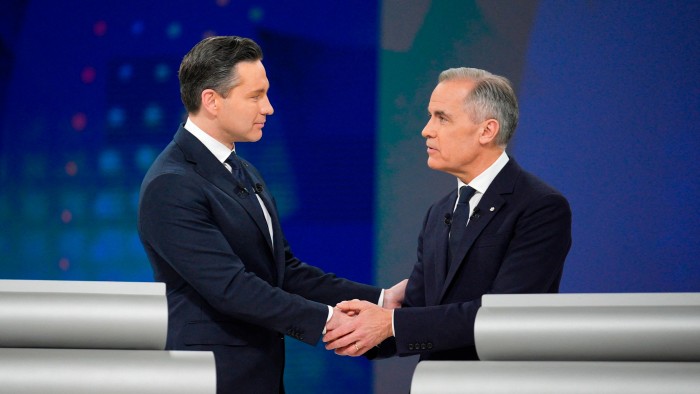Unlock the Editor’s Digest for free
Roula Khalaf, Editor of the FT, selects her favourite stories in this weekly newsletter.
As Canadians prepare to go to the polls on Monday, they are being bombarded with misleading rightwing content on US social media platforms that has fuelled concerns about their potentially damaging role in the general election.
A Financial Times analysis of more than 350,000 posts on X related to the election, gathered since the snap poll was announced in March, revealed a network of co-ordinated accounts pushing content to boost Conservative leader Pierre Poilievre and tarnish his counterpart, the Liberal’s Mark Carney.
Foreign electoral interference has been a concern in Canada after a government-appointed commission in January reported China, India and Russia had tried to influence the country’s elections.
In the current campaign, researchers say an increasing volume of misinformation is coming from the US, including from rightwing podcasters and influencers as well as bots on American social media platforms that have reduced content controls.
“The US has always been a major information exporter to Canada,” said Aengus Bridgman, director of the Media Ecosystem Observatory at McGill University in Montreal. But in recent years there have been “mass amounts of disinformation coming from the influencer sphere in the US”, he added.
The FT’s analysis, in collaboration with a team of researchers at the University of Southern California led by Luca Luceri, identified a network of suspicious accounts promoting rightwing memes and news sources collected from posts appearing for the queries: #cdnpoli, Canada, Mark Carney, Pierre Poilievre.
The accounts have tell-tale signs of being bots: posting at very high volume and frequency, often only retweeting content, and consistently sharing a variety of common links — in this case promoting Poilievre and attacking Carney. Often the accounts push misleading content, such as associating Carney with the late disgraced financier Jeffrey Epstein.
Luceri said: “Our approach is deliberately cautious to reduce misclassification and minimise false positives — ensuring that organic accounts are not misclassified as malicious actors.”
“Therefore, our analysis likely represents a lower bound of malicious inauthentic activity in the run-up to the election, as additional accounts and networks may also be operating under the radar.”
Researchers could not trace where the accounts are based.
it’s all coming together for China – not so much for Canada! https://t.co/6bjeVIVl0h
— Janice Price (@JaniceP12312102) April 24, 2025
Elon Musk, the owner of X, publicly endorsed Poilievre for prime minister in January. He has been vocal in support of rightwing political parties and figures — including Germany’s far right AFD and rightwing political parties and figures in the UK.
Musk loosened moderation restrictions and cut resources when he took over the platform, while Meta chief executive Mark Zuckerberg earlier this year also relaxed his social media network’s moderation policies. Conservatives who had expressed unease about rightwing views being censored welcome the moves. However, civil rights groups and academics have raised concerns about the lack of policing leading to more dangerous false information spreading on these platforms.
Meta has blocked news content in Canada in a dispute with the government over efforts to make online groups pay publishers for content.
The Facebook owner said it has a dedicated team focused on ensuring “Canadians have accurate information about participating in the election” and works with the country’s elections agency and political parties. X did not respond to a request for comment.
The FT analysis of X reveals how more of the content on the platform favours the right. While opinion polls show Carney’s Liberals ahead of Poilievre’s Conservatives, the vast majority of X posts — roughly 80 per cent — analysed by the FT are critical of Carney, while the majority of posts about Poilievre are favourable.
Cyabra, a Tel Aviv-based company that tracks disinformation, also uncovered a widespread bot-driven campaign on various social media platforms against Carney, in which fake accounts portrayed him as an “unelected elitist” and spread doctored images.
Research by the Canadian Digital Media Research Network, an anti-disinformation platform, has found Facebook groups have been used to support for the idea of Canada becoming a US state — a threat US President Donald Trump has repeatedly made.
The network has also found the proportion of Canadians who say they are concerned about deceptive political influence originating from the US has increased dramatically. Its findings show voters are more concerned about covert political meddling from the US than from China, Russia or India.
Reset Tech, a digital media advocacy group, shared findings with the FT, which document how US-based X accounts have been driving engagement and memes about Canada becoming the 51st US state. The group has also reported US-based political TikTok influencers are reaching increasingly large audiences north of the border.
Online interference is not only coming from the US. Canada’s election interference agency — the Security and Intelligence Threats to Elections Task Force (Site) — has reported social media accounts linked to the China’s government are also “very active” and are targeting Chinese-speaking Canadians.
“This is not about a single online act, but rather a series of acts designed to discredit a candidate, silence criticism and dissent, and manipulate information that informs voters,” Site reported this week.
In March, the Communications Security Establishment — Canada’s main signals intelligence agency — warned China, Russia and Iran would “very likely” use artificial intelligence to mislead voters in the federal election.
“The (AI) threat against future Canadian general elections is likely to increase,” the report warned.










